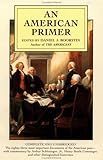An american primer Por Daniel Boorstin, editor
By: Boorstin, Daniel [Editor(a)]
Material type: TextLanguage: English Publisher: New York: Meridian, 1995Description: 1056 páginas; 21 cmContent type: texto Media type: no mediado Carrier type: volumenISBN: 9780452009226Subject(s): Historia de Estados Unidos | Historia Norteamericana | Estados Unidos - HistoriaDDC classification: 973
TextLanguage: English Publisher: New York: Meridian, 1995Description: 1056 páginas; 21 cmContent type: texto Media type: no mediado Carrier type: volumenISBN: 9780452009226Subject(s): Historia de Estados Unidos | Historia Norteamericana | Estados Unidos - HistoriaDDC classification: 973 | Item type | Current location | Home library | Collection | Call number | Status | Date due | Barcode | Item holds |
|---|---|---|---|---|---|---|---|---|
 Libros
Libros
|
Campus Central Estantería | Campus Central Estantería | Colección de divulgación general | 973 B64449 (Browse shelf) | Available | 01-023992 |
The mayflower compact, 1620. — John Winthrop, a modell of christian charity,1630. — Mary Easty, petition of a accused witch, 1692. — Gabriel Thomas, an account of Pennsylvania, 1968. — Benjamin Franklin, father Abrahm's speech, or, the way to wealth, 1757. — Logan's speech, 1774. — Thomas Jefferson, the declaration of independence, 1776. — Benjamin Franklin, address to the federal convention, 1787. — The constitution of the United State of America, 1787. — George Washington, first inaugural address, 1789. — Alexander Hamilton, report on manufactures, 1791. — George Washington,farewell address,1796. — Thomas Jefferson, first inaugural address, 1801. — Jacob Henry, on religion and elective office, 1809. — John Adams, what do we mean by the american revolution? 1818. — John Marshall, M'Culloch v. Maryland, 1819. — James Monroe, the Monroe doctrine, 1823. — Andrew Jackson, the majority is to govern, 1829. — William Lloyd Garrison, prspectus for the Libertador, 1831. — Ralph Waldo Emerson, the american scholar, 1837. — Lemuel Shaw, commonwealth v. Hunt, 1842. — Henry David Thoreau, civil disobedience, 1846
From the Mayflower Compact of 1620 to President Johnson's 1965 Address of Voting Rights, here are documents that will endure as long as our nation exists. The eighty-three selections in this volume span the spectrum of American political, economic and cultural history as it was made, and as it was lived. All are put in clear perspective as they are analyzed by distinguished historians.


There are no comments on this title.